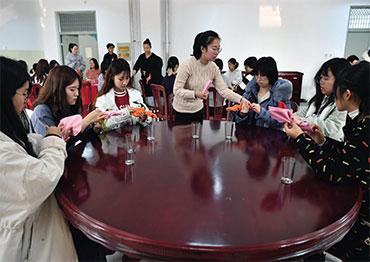More importantly, cultivating talents in colleges is part of China’s long-term plan to meet demand, create jobs and standardize the industry.
In 2022, the number of people in China aged 65 and older surpassed 209 million. Those above 60 are expected to reach 400 million by 2035, more than 30 percent of the total population. In 2021, China expanded its child birth policy to three children per married couple. Experts predict these changes will spur demand for household services.
Data from Reportrc.com, an industry research platform, shows that between 2015 and 2021, the scale of China’s housekeeping market quadrupled from 277.6 billion yuan (US$38.7b) to 1.01 trillion yuan (US$139.6b).
There are already 30 million people working in China’s domestic services industry. However, another 20 million are needed: Domestic services remained among the top 10 professions suffering the greatest labor shortages in 2022, according to China’s Ministry of Human Resources and Social Security. At the opposite end of the spectrum is the bleak job market amid China’s economic downturn. In June, youth unemployment soared to 21.3 percent, a record high since 2018.
China has released policies to boost the industry. In an unprecedented guidance released in 2019, the State Council suggested setting up home economics courses in at least one university, several vocational colleges per province and expanding enrollment.
In October 2021, China released another document saying it will develop the domestic services sector in the next five years to facilitate central government-driven rural revitalization efforts. Among other measures, it stipulated financial support for enterprises and enhanced vocational cultivation, which aim to improve professionalism and better enable workers from rural areas to find jobs by 2025. Similar policies rolled out in 2022 and 2023.
“Enhancing talent cultivation will help ease labor shortages and employment concerns, as well as promote the overall industry. An industry without high-quality talent cannot develop well,” said Yao from Chuanyu Aunties, who worked in online education before starting his business in 2021.
“Demand for household services keeps growing, but migrant workers in their 50s and 60s, the main source of workers in the sector, will gradually retreat from the market and few young people want to take their places. Highly educated talent could help train migrant workers to better meet market demands. Training also decreases substandard practices in the industry,” Yao said.
In 2022, Zhejiang Province encouraged college graduates to start up domestic service-related businesses, providing loans up to 500,000 yuan (US$69,088) with promises to cover at least 80 percent of the loan if they fail.
On July 13, 16 government departments led by the Ministry of Commerce jointly issued a document encouraging college graduates to work in and start businesses in the domestic services industry. Besides encouraging such companies to hold job fairs on campuses, the document makes young entrepreneurs eligible for government subsidies.
Yao said the low threshold for workers on app-based housekeeping platforms is partly to blame for the industry’s stagnated development. “Professional training is rare at most companies, let alone the standardization of equipment,” Yao said.
The majority of those on housekeeping apps work part-time and lack professional training. Yao said all his cleaners are full-time employees. After their shift they meet for more training to improve their service.
“They receive professional guidance on how to wipe a table or how to clean a range hood. They are equipped with professional tools like steam cleaners for kitchens. We try to do it professionally instead of muddling along,” Yao said, adding “I believe people who enter the field with a college background will make a difference too.”
Li from Chuanyu Aunties said she does not worry about losing work in the transformation. “There’s sufficient demand. If I can’t provide high-end services, I can do low-end ones. I can also go home. I’m confident as long as I’m doing the job right and recognized by customers,” Li said.

 Old Version
Old Version

